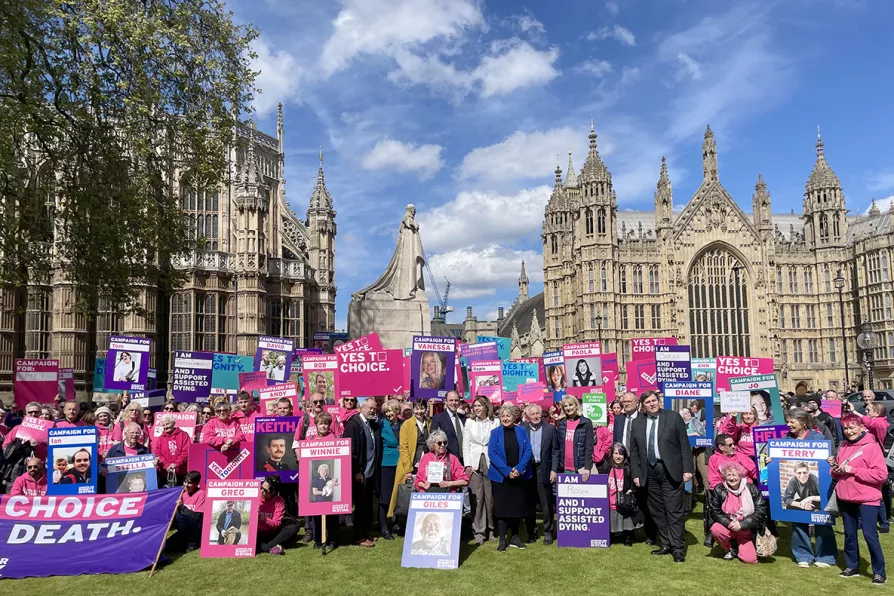The Mandelson scandal reveals a political settlement in which democratic choice is curtailed and the power of markets eclipses the will of voters – only the left can challenge this, writes JON TRICKETT MP

 Campaigners are joined by some Members of Parliament as they protest outside Parliament in Westminster, London, ahead of a debate in the House of Commons on assisted dying, April 29, 2024
Campaigners are joined by some Members of Parliament as they protest outside Parliament in Westminster, London, ahead of a debate in the House of Commons on assisted dying, April 29, 2024
BEGIN with a story of a relative dying of emphysema many years ago when I was young. In his eighties, barely able to rasp out words, he said repeatedly, as his family crowded around his bedside, “I want to die.” He died a few days later, but that scene continues to haunt me.
Later, I wondered why the doctor could not have sped things along. Why should someone suffer needlessly at the end of life?
That’s it. That’s the case for legalising assisted dying/assisted suicide (AD/AS) right there. In emotional terms, it’s pretty powerful. But the more we consider it, the more problematic and complex it becomes.
In fact, the debate on the run-up to Kim Leadbeater’s soon-to-be-revealed private member’s Bill is best characterised not by rationalist thought versus backwards religious prohibition, or by left and right, but by emotions versus thoughtful consideration.
The campaign for legalised AD/AS relies almost entirely on emotion. Tory Kit Malthouse called for a vote on the “side of compassion and humanity.” But let’s look closely at what is actually proposed.
What about autonomy? Our bodies, our choice? This is a false argument. Suicide is already legal, thanks to the legislation campaigners wish to eradicate. Plus, do we wish to allow other forms of consensual killing, like duelling or cannibalism? That would be real autonomy.
Let’s break it down. First the language. “Assisted dying” sounds nicer, but the British legislative proposals all deal with either suicide or euthanasia.
The real question is, do we give the proverbial man teetering on the bridge a push if he asks for it? If a doctor knowingly handed a patient a gun and the patient shot herself, that would be suicide, no matter how long she had to live. We are meant to believe that knowingly handing a patient deadly drugs is somehow different? Come on!
Second, AD/AS does not address the situation of pain and discomfort at the end of life. In the Netherlands, where euthanasia has been legal for more than 20 years, a 2022 article on suffering at the end of life noted that “at least one symptom-related care goal was not achieved for 28.5 per cent to 42.8 per cent of patients.”
In fact, AD/AS is not about pain, as surveys show where it is legal. Physical pain is nowhere the major reason why people request it and is not even in the top five reasons why people opt for AD/AS in Oregon, according to all Oregon reports since 1998.
Third, the policy expands once it becomes medical treatment for suffering. In every jurisdiction where it has been legalised for any length of time, the “safeguards” fall.
In the Netherlands, at least eight autistic people have received euthanasia. A man in his twenties complained that he could not make social connections and was lonely. He was euthanised by his doctor. At least 60 women have been euthanised worldwide — including in the US — because they suffered from anorexia.
The numbers inevitably rise as more and more people who are suffering ask for this “medical treatment.” Canada’s assisted dying deaths increased tenfold from 2016 to 2021, Oregon’s fourfold from 2009 to 2020 and in the Netherlands, euthanasia and assisted suicide rose from 1.2 per cent of deaths in 2003 to 4.2 per cent in 2019.
But the best argument against legalising AD/AS is that not all campaigners have compassion in mind. Behind the mask of compassion is efficiency. In the 1930s, the Third Reich unsuccessfully attempted to persuade Germans to embrace euthanasia with posters arguing that savings could be made by euthanising the “defectives” — “Fellow citizen, that is your money too.”

Focus on equal access to assisted death rather than risks of legalisation for oppressed groups wrongheaded, MPs and campaigners say













